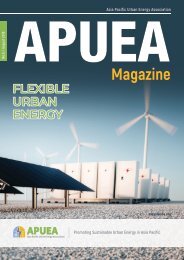APUEA Magazine-no.5 June 2019
Create successful ePaper yourself
Turn your PDF publications into a flip-book with our unique Google optimized e-Paper software.
<strong>APUEA</strong> <strong>Magazine</strong> | No.5 / <strong>June</strong> <strong>2019</strong><br />
Standards Name<br />
Target<br />
Audience<br />
Consistency<br />
with major<br />
IPCC<br />
emission<br />
sources<br />
categories<br />
Adoption of<br />
in-boundary<br />
/out of<br />
boundary<br />
framework<br />
In boundary<br />
emissions<br />
Out of<br />
boundary<br />
emissions<br />
Gases<br />
Detailed<br />
guidance<br />
on<br />
Calculation<br />
methodologies<br />
Guidance<br />
setting<br />
Reduction<br />
targets<br />
Global Protocol for Community-<br />
Scale GHG Emissions Inventories<br />
(GPC), C40 ICLEI WRI (2014)<br />
1996/2006 IPCC Guidelines<br />
for National Greenhouse Gas<br />
Inventories<br />
International Local Government<br />
GHG Emissions Analysis Protocol<br />
(Version 1.0), ICLEI (2009)<br />
International Standard for<br />
Determining Greenhouse Gas<br />
Emissions for Cities (Version 2.1),<br />
UNEP UN-HABITAT World Bank<br />
(2010)<br />
ILLUSTRATIVE<br />
Baseline Emissions Inventory/<br />
Monitoring Emissions Inventory<br />
Methodology<br />
The Covenant of Mayors Initiative<br />
(2010)<br />
U.S. Community Protocol for<br />
Accounting and Reporting of<br />
Greenhouse Gas Emissions<br />
(Version 1.0) ICLEI USA (2012)<br />
PAS 2070: Specification for the<br />
assessment of greenhouse<br />
gas emissions of a city, BSI (2013)<br />
The International Institute for Energy Conservation (IIEC) was founded in 1984 to dramatically increase the use of energy<br />
efficiency as an important clean energy approach in developing countries. We believe local presence is the best way to bring<br />
about results, and through our regional offices all over the world, we have been effective in bringing about progress in energy<br />
efficiency policy and implementation that has both reduced energy consumption by thousands of MWs and fostered<br />
economic development in the countries we serve. The IIEC works with stakeholders across all sectors to connect<br />
international best practice with the unique needs of the communities in which we operate, combining sound energy<br />
efficiency, Demand-side management (DSM) and renewable energy policy with hands-on implementation in order to reduce<br />
greenhouse gas emissions and encourage sustainable development.<br />
20




